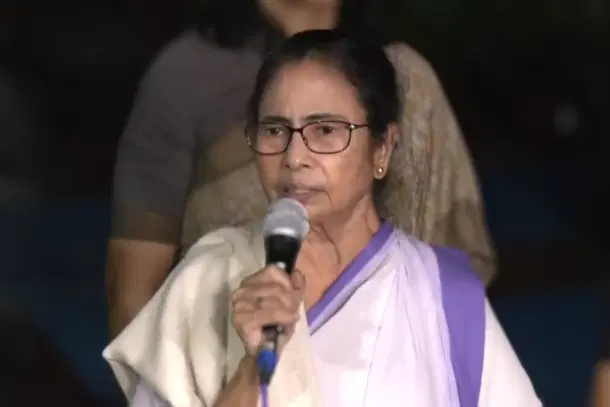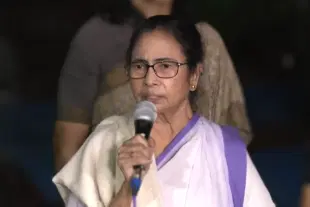West Bengal
Why Mamata Banerjee Conceded To Junior Doctors' Demands To Remove Kolkata Police Chief And Others
Jaideep Mazumdar
Sep 17, 2024, 11:35 AM | Updated 11:40 AM IST
Save & read from anywhere!
Bookmark stories for easy access on any device or the Swarajya app.


For perhaps the first time in her political career, Bengal Chief Minister Mamata Banerjee has blinked.
Her acceptance of the primary demands of the junior doctors whose casework was on its thirty-ninth day when they met her at her Kalighat residence Monday evening (16 September) was a massive and first-ever climbdown by Banerjee.
She has never known to have retreated in the face of pressure, but the strike by junior doctors was a huge challenge to her.
The junior doctors emerged triumphant from the over two-hour-long meeting with Banerjee after she agreed to almost all their demands.
A stone-faced, subdued Banerjee later announced that Kolkata Police Commissioner Vineet Goyal, Kolkata Police Deputy Commissioner (North) Abhishek Gupta, Director of Medical Education Kaustuv Nayek, and Director of Medical Education Debashis Halder will be removed from their posts.
Banerjee also conceded to the other substantive demands of the junior doctors: improved security for doctors in state-run hospitals, an end to the ‘threat culture’ in medical education, upgrading infrastructure in state-run healthcare facilities, and justice for the RG Kar rape-murder victim.
The ‘threat culture’ is a reference to a very powerful lobby of senior and junior doctors (popularly called the ‘North Bengal lobby’) extorting huge sums from undergraduate and postgraduate medical students in return for high marks and passing the exams, forcing students to align themselves with the Trinamool Congress, controlling postings and transfers of government doctors, and many other acts of corruption and wrongdoing.
This lobby comprised physicians who are senior Trinamool Congress leaders. Other doctors in the lobby, which also included Sandip Ghosh (the tainted ex-principal of RG Kar Medical College), were close to top leaders of the ruling party.
While announcing the removal of the top police and health department officers, the Chief Minister said that a committee headed by Chief Secretary Manoj Pant will examine the infrastructure and security upgrade in government hospitals.
The meeting at Banerjee’s Kalighat residence, which started at 6.40 pm and ended at 8.50 pm, was attended by 42 junior doctors. They had reached the CM’s residence in response to a “fifth and final” invitation for talks sent by the Chief Secretary Monday noon.
Two earlier attempts by Banerjee at holding a dialogue with the striking junior doctors had failed over the latter’s insistence that the proceedings be livestreamed.
Banerjee had turned down this condition on the ground that the matter was subjudice and, hence, only a video recording of the meeting would be conducted and the footage released to doctors after the Supreme Court’s permission.
The junior doctors also relented Monday and agreed to the state’s offer to allow them to record the minutes of the entire meeting. Accordingly, the doctors took along their own stenographers. But finalising the minutes of the meeting took nearly three hours, and the minutes, signed by both sides, were ultimately released a little past midnight.
Why Mamata Banerjee Relented
According to senior Trinamool leaders who were consulted by Banerjee many times during the entire course of the stir, the state government had no problem in agreeing to the demands of the doctors for ensuring their security in government hospitals and for upgrading the infrastructure in state healthcare facilities.
“We also had no issue with cleaning up the medical education system and rooting out corruption and misdeeds as highlighted by the junior doctors. Our Chief Minister had repeatedly pointed out that she has no ties with those who are accused of corruption and wrongdoings and has already initiated tough action against them,” a senior cabinet minister who is part of Banerjee’s inner circle told Swarajya.
The Chief Minister, he pointed out, had also spoken for justice for the rape-murder victim. “The case is with the CBI now, and she has said she wants the death penalty for the guilty. She has been in complete solidarity with everyone who seeks justice,” the minister added.
However, it was the doctors’ demand for the removal of top police and health department officers that was the stumbling block.
“Mamata Banerjee does not respond to threats and challenges to her authority. She interpreted the doctors’ demand for the removal of the officers who they viewed as guilty of an alleged cover-up as a direct challenge to her authority. So she was adamant on not conceding this demand by the doctors,” said another senior Trinamool Congress functionary.
The Chief Minister, he said, had viewed this demand (for the removal of top officers) as unjustified and contended that it would set a bad precedent. “Next time something happens, people will again demand the removal of officers irrespective of their innocence. We cannot function by bowing to such demands that may crop up in the future," Banerjee is said to have told her aides.
But her close aides told her that the removal of at least some of the officers would be a prudent step. She was told repeatedly by everyone close to her as well as state intelligence officers who were constantly updating her about the junior doctors’ stir that public sympathy was with the doctors.
“Many of our own party members and supporters were participating in the protests, marches, and demonstrations and were showing solidarity with the striking doctors. People were solidly behind the doctors. The public perception that police and health department officers were involved in a cover-up of the crime was very strong,” said the senior Trinamool Congress functionary.
Banerjee also realised herself that public sympathy lay solidly behind the doctors and the popular mood was against the state government and the ruling party.
She ultimately realised that any coercive action against the striking junior doctors or rejection of their demands for removal of the officers would turn the tide more firmly against the government and the ruling party.
She also realised that people wanted heads to roll, and sacrificing the top officers was a small price to pay for regaining public support.
“She let pragmatism override her innate obstinate nature. It was a tough decision for her. She had never backtracked from challenges or conceded defeat. But she knew that this time she had to bow down to the demands of the doctors. A continuing stalemate would hurt her politically and erode public support for her. So she swallowed her ego for the first time,” said a senior lawyer who was once close to Banerjee.
There is no doubt, therefore, that the strong and continuing public support for the doctors led Banerjee to concede their demands, including that of removing the top officers.
Another development on Saturday evening (14 September) — the arrest of former RG Kar Medical College principal Sandip Ghosh and officer-in-charge of Tala police station by the Central Bureau of Investigation (CBI) on charges of criminal conspiracy and destruction of evidence in the rape-murder — also played a major role in leading Banerjee to concede the doctors’ demand for removal of the officers.
The arrests strengthened public perception that evidence was destroyed and a cover-up was attempted. Banerjee was told by her aides that the tide was turning against her after this development and she needed to distance herself from all those who are perceived to be guilty of a cover-up.
She was also told that if she removed the officers, her image would receive a lift.
That’s why Banerjee ultimately relented and conceded defeat.
Junior Doctors Also Relented
It wasn’t, however, only Banerjee who backtracked. The junior doctors also did.
They were adamant on their demand that their meeting with Banerjee be livestreamed. When the state government turned down this demand, they said they should be allowed to record the proceedings by videographers.
The state government again turned down this demand and said only government videographers would record the proceedings, and the footage would be handed over to the doctors only after obtaining permission from the Supreme Court.
But the doctors remained unrelenting. As they waited in the pouring rain outside Banerjee’s residence Saturday, the Chief Secretary and others told the doctors that they would be allowed to take down the minutes of a meeting with the Chief Minister, and both sides could then finalise the minutes and exchange the minutes. Banerjee would sign the minutes of the meeting.
The striking junior doctors took some time to discuss this demand and accept it. But when they conveyed their acceptance, the Chief Secretary and junior health minister, Chandrima Bhattacharya, said it was too late.
Because, by that time, news of the CBI's arrest of Ghosh and a police officer involved in the initial probe in the rape-murder for conspiracy and destruction of evidence had reached Banerjee. She was upset by the news and refused to meet the doctors.
When the “fifth and final” invite for talks reached the doctors Monday, the senior doctors who had been advising their juniors piled pressure on them to accept the invitation.
The senior doctors told their juniors that an indefinite strike was not feasible. With junior doctors at the hospitals attached to the state-run medical colleges staying away from their duties for 39 days, it was the senior doctors who were filling in for the juniors.
“Senior doctors were putting in very long hours and were tired after the long haul. So they wanted a resolution. We were also told that the hearing on the case in the Supreme Court scheduled for Tuesday (September 17), remaining adamant and refusing to talk to the Chief Minister would portray us in a poor light,” said a junior doctor who is part of the stir.
The striking junior doctors, under the banner of the West Bengal Junior Doctors’ Forum (WBJDF), ultimately reached the Chief Minister’s residence at 6.25 pm Monday.
The meeting, according to sources, was cordial, and Banerjee repeatedly told the junior doctors that she sympathised with them and was like an “elder sister” to them.
“She treated them with a lot of affection and made them feel at home. The Chief Minister is very adept at this. Her charm worked,” said the senior cabinet minister.
But the fact that she backtracked from her earlier adamant stand on not removing any officer is significant.
Monday’s development — the acceptance of the junior doctors’ demands and removal of top police and health officers — is, therefore, a major moment in Banerjee’s political journey.




